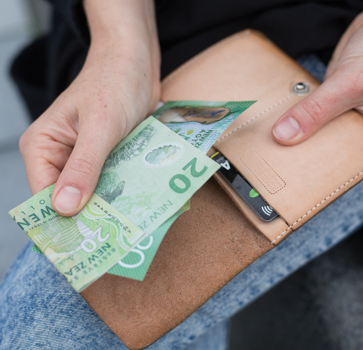Uninvited sales, goods, and services
Door-to-door sales and other uninvited direct sales
An “uninvited direct sale” is when a sales person comes uninvited to your house, workplace or over the phone to offer you goods or services. For example, a sales person coming to your door and convincing you to sign up to a new power or internet provider is classed as an “uninvited direct sale,” if the contract is for $100 or more.
If a sales person comes to your house uninvited, you can tell them to leave. It is an offence if they don’t comply. They must also follow any signs you put up, like “Do Not Knock” stickers which are issued by Consumer NZ.
If you’ve agreed to buy something from an uninvited direct sale, you have 5 days to cancel it and get your money back.
What is an “uninvited direct sale”?
The protections against uninvited direct sales apply when you buy goods or services, and:
- the seller has come uninvited to your home or workplace, or has phoned you uninvited, and
- the price that you’ve paid or will pay under the agreement is more than $100, or the price isn’t known at the time that you receive the goods or services.
It will still be an “uninvited” direct sale even if:
- you gave your name or contact details to the seller for some other reason, and later they came to your home or workplace or phoned you to try to sell you goods or services
- the sale happens when you ring them back after they tried unsuccessfully to contact you (for example, if they had left a voice message)
- you had earlier bought something from the seller after inviting them to phone you or to come to your home or workplace that previous time.
Information that a seller has to give you
A door-to-door seller or an uninvited seller has a legal obligation to give you certain information. If they don’t, the Commerce Commission can fine them up to $2,000. The seller must make sure:
- The agreement is in writing.
- The wording should be clear, easy to read, and in plain language.
- You get a copy of the agreement.
- If the sale is in person, you should be given a copy of the agreement straight away.
- If the sale was over the phone, you should be sent a copy within the next five working days.
- The agreement clearly states how much you have to pay.
- If it’s not known, it should say how the price will be calculated.
- It should include the total price you’ll have to pay, including any extra payments such as interest.
- The agreement is dated.
- On the front page, the agreement includes:
- a clear description of what you’re buying
- a summary of your right to cancel the agreement (see below)
- the seller’s name, street address, phone number and email address
- your name and street address.
Additionally, before you agree to anything, the seller must also tell you verbally about your right to cancel the agreement, and how to do so.
Can I cancel an uninvited direct sale?
If the seller complies with their obligations (you’ve been given a copy of an uninvited direct sale agreement and you were given all the required information), you can cancel the agreement but you have a time limit of five working days after you received the copy. If you don’t cancel in time, the seller can enforce the agreement and claim any unpaid amounts.
If you weren’t given a copy, or the seller doesn’t comply with their obligations (see above), there is no time limit and you can cancel at any time. However, this only applies if their failure to comply was significant and caused you a disadvantage – if it was a minor failure, the five working days time limit still applies.
To cancel, contact the seller (using the contact details given on your agreement) and let them know that you want to cancel the agreement. There’s no particular process or words you have to use.
What happens if I cancel an uninvited direct sale?
Fair Trading Act 1986, ss 36O-36R
If you cancel an uninvited direct sale agreement within the five working day time limit (note that if the seller did not comply with their obligations, this time limit doesn’t apply and you can cancel at any time), the agreement is treated as if it had never been made. This means the seller must immediately repay you all the money you’ve paid.
If you bought goods, the seller will have 10 working days from when you cancel to come collect the goods from your address. You need to give them a reasonable opportunity to do so, and you need to take reasonable care of the goods for those 10 working days. If you don’t allow the seller reasonable opportunity to collect them, you have to continue to take reasonable care of the goods until you have. Until then, if you intentionally throw away or damage the goods, you’ll have to pay the seller compensation (but you’re not responsible for accidental damage).
If you bought services, the seller isn’t entitled to be paid even if the services have already been provided. If your property was changed or damaged by these services, you can require the seller to return it to the condition it was before, at their own expense.

